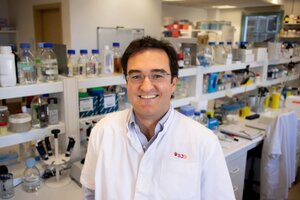A nanomedicine to improve treatment of Ewing sarcoma
A team led by Dr. Ángel Montero Carcaboso at the Institut de Recerca Sant Joan de Déu (IRSJD) shows that albumin nanoparticles improve the biopharmaceutical properties of paclitaxel in a rare type of tumor called Ewing sarcoma. The publication is highlighted on today's cover of the Journal of Controlled Release.
Albumin is the most abundant protein of the human blood and it is used as a carrier component in cancer nanomedicines. The main albumin-made nanodrug is nab-paclitaxel, approved by several governmental medicine agencies for several cancer indications.
Scientific evidence indicates that tumors that secrete a protein named SPARC (also known as osteonectin) take up albumin nanoparticles better than tumors in which SPARC is not abundant. Pediatric sarcomas, an uncommon and heterogeneous group of skeletal and soft tissue neoplasms, are among the cancers that secrete SPARC. They account for approximately 12% of pediatric solid tumors and the most common are Ewing sarcoma, osteosarcoma, and rhabdomyosarcoma.
Relationship of SPARC and nab-paclitaxel in Ewing Sarcomas
Because SPARC shows high binding affinity to albumin, researchers hypothesized that SPARC-secreting pediatric sarcomas would take up and accumulate nab-paclitaxel.
"Our project shows that for two identical pediatric sarcoma tumors, only differing in the expression of SPARC, nab-paclitaxel accumulates and is more powerful in the one with the highest expression of this protein. This is due to the prolonged retention of the nanodrug in the tumor, mediated by the interaction between the albumin nanoparticles and SPARC" says Dr. Carcaboso, head of the research group in Pediatric Cancer Treatment (IRSJD).
A new potential treatment for pediatric sarcomas
In addition, the study shows that patient-derived Ewing sarcomas engrafted in mice accumulate more nab-paclitaxel and are more sensitive to this treatment when they are rich in SPARC.
"However, we cannot generalize that tumors with high SPARC secretion are always sensitive to nab-paclitaxel treatment. Several factors in patients and tumors affect the efficacy of treatments. In this sense, we are developing a new project to better predict the efficacy of nab-paclitaxel in pediatric sarcomas" comments Dr. Carcaboso.
Pediatric cancer research at IRSJD is conducted by a multidisciplinary team at the SJD Barcelona Children's Hospital. Research results have led to Phase 1 clinical trials in children with cancer, including advanced therapies. The new Pediatric Cancer Center Barcelona will be launched in 2022 to treat more than 400 pediatric cancer patients per year.
Paper reference
Pascual-Pasto G, Castillo-Ecija H, Unceta N, Aschero R, Resa-Pares C, Gómez-Caballero A, Vila-Ubach M, Muñoz-Aznar O, Suñol M, Burgueño V, Gomez-Gonzalez S, Sosnik A, Ibarra M, Schaiquevich P, de Álava E, Tirado OM, Mora J, Carcaboso AM. SPARC-mediated long-term retention of nab-paclitaxel in pediatric sarcomas. J Control Release. 2021 Dec 30;342:81-92. doi: 10.1016/j.jconrel.2021.12.035. Epub ahead of print. PMID: 34974029.

For two identical pediatric sarcoma tumors, only differing in the expression of SPARC, nab-paclitaxel accumulates and is more powerful in the one with the highest expression of this protein.
